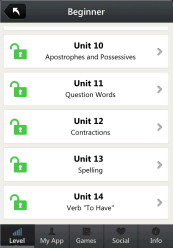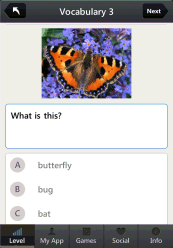English Grammar - Beginner
There Is - There Are
Go To Quizzes >>> There Is / Are
We use there is or there are to say something exists for the first time.
We use there is in front of single or uncountable nouns and we use there are in front of plural countable nouns.
| Positive | Negative | Question |
|---|---|---|
|
There is There are |
There isn't There aren't |
Is there? Are there? |
Examples:
There is a large airport in Los Angeles.
There isn't any butter in the fridge.
Is there a public telephone near here?
There are three sofas in the living room.
There aren't any mushrooms on the table.
Are there any people in the house?
We do not use "it" to talk about something for the first time.
We say:
There is a large bank in Jones Avenue.
NOT It is a large bank in Jones Avenue.
But we can use "it" when we talk about something again, a specified thing:
There is a large bank in Jones Avenue. It closes at 4pm.
Possessive 'S
Go To Quizzes >>> Possessive 'S
See video: 'S - Verb or Possession?
We use 's to show who owns something.
Examples:
John's car is red.
My mum's house is in the country.
Poland's flag is red and white.
If more than one person owns something, we can use s' to show this.
The parents' responsibility is to their children.
There is a boys' school at the end of the road.
If a person's name ends with "s", we can also put the apostrophe after the final letter.
Bess' mother was from Ireland.
The Jones' house was sold yesterday.
Be careful to put the 's at the end of the name of the person who owns the item, not the item that is owned!
Howard's house is very large.
NOT House's Howard is very large.
English Learning Lounge - iOS and Android Apps |
||

|
Our app for both Android and iOS to help you improve your English!
|

|
Can
Go To Quizzes >>> Can
We use "can" to say someone has the ability to do something.
She can dance very well and always goes to discos.
He can speak Italian.
|
Can |
||
| Positive | Negative* | Question |
|
I can You can He can She can It can We can You can They can |
I can't You can't He can't She can't It can't We can't You can't They can't |
Can I? Can you? Can he? Can she? Can it? Can we? Can you? Can they? |
*In all cases, can't can be replaced by cannot.
Examples:
My mother can play the piano.
Can your parents play any musical instruments?
I can't see or hear anything in this room.
We must use can with an infinitive verb directly after it, without "to".
We can go to the cinema after the restaurant.
NOT We can to go to the cinema after the restaurant.
